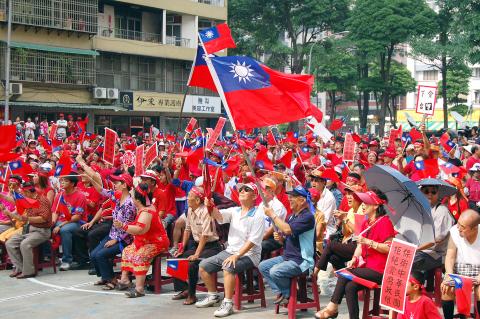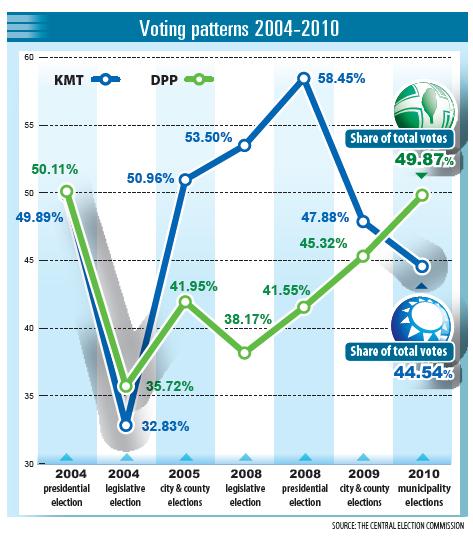The likelihood that the Democratic Progressive Party (DPP) would win the presidential election in 2012 surpassed that of the Chinese Nationalist Party (KMT) following Saturday’s special municipality elections, a university prediction center said yesterday.
Prediction markets are speculative exchanges, with the value of an asset meant to reflect the possibility of a future event. Members can tender virtual bids on events, with the bidding price reflecting the probability.
Results from the five elections showed that although the KMT won three of the five mayoral seats, it gained only 44.5 percent, or 3.4 million, of the total votes compared with the DPP’s 49.9 percent, or 3.8 million votes.

PHOTO: HOU CHENG-HSU, TAIPEI TIMES
On a scale of NT$0 to NT$100, National Chengchi University’s Prediction Market Center said the odds that the KMT would win the 2012 poll dropped from NT$49.4 on Oct. 26 to NT$46.7 on Saturday.
In contrast, the value of the DPP stood at NT$56.9 yesterday, an increase of NT$5.3.
The center said since the two parties completed nominations for Saturday’s elections at the end of May, the prospects of their winning the 2012 presidential election remained at around NT$50. However, the price of the KMT fell to NT$48.6 on Nov. 14 and down to NT$46.7 on Thursday. That of the DPP increased to NT$53.1 at the end of last month and reached NT$55.3 on Friday.

GRAPHIC: TT
The center also surveyed the possibility of President Ma Ying-jeou (馬英九) winning re-election in 2012. The center said the price hovered around NT$34 and NT$35 between May 27 and Nov. 14. It fell to NT$32.6 on Nov. 15 and descended further to NT$30.3 on Saturday. The special municipality elections clearly had an impact on Ma’s chances of winning, the center said.
Of the nominees, Ma remained the most favored KMT candidate, whose latest price was NT$77.7 yesterday. Legislative Speaker Wang Jin-pyng (王金平) was valued at NT$16.2, Greater Taichung mayor-elect Jason Hu (胡志強) was NT$5.8 and Sinbei City mayor-elect Eric Chu (朱立倫) was NT$5.4.
Among the DPP’s possible presidential hopefuls predicted by the center were DPP Chairperson Tsai Ing-wen (蔡英文), former premier Su Tseng-chang (蘇貞昌) and former premier Frank Hsieh (謝長廷).
The center said that the likelihood that Tsai would represent her party in the 2012 election was NT$40 on May 27 and increased to NT$42.5 on June 21, but plunged to NT$32.6 on Thursday. However, it climbed up to NT$35.5 after Saturday’s elections.
That of Su was NT$12.4 on Nov. 20 and rose to NT$14.6 on Friday. It jumped up to NT$29.1 yesterday.
Hsieh’s value surged from NT$17.5 on June 25 to NT$44 on Friday. It has since dropped, however, to NT$39.9.
Despite the latest values suggested by the prediction market center, re-elected Taipei Mayor Hau Lung-bin (郝龍斌) said yesterday he was optimistic that Ma would be re-elected in 2012.
Hau said the party’s three-to-two win is “a good sign” that the KMT has risen from a position where its strongholds were believed to have been at risk.
“I am cautiously optimistic about President Ma’s chances in the 2012 election,” Hau said, adding that the shaky forecasts of the party’s performance in the elections were due to the global financial crisis and the problems caused by Typhoon Morakot, Taiwan’s deadliest storm ever, which hit on Aug. 8 last year.
ADDITIONAL REPORTING BY CNA

‘FORM OF PROTEST’: The German Institute Taipei said it was ‘shocked’ to see Nazi symbolism used in connection with political aims as it condemned the incident Sung Chien-liang (宋建樑), who led efforts to recall Democratic Progressive Party (DPP) Legislator Lee Kun-cheng (李坤城), was released on bail of NT$80,000 yesterday amid an outcry over a Nazi armband he wore to questioning the night before. Sung arrived at the New Taipei City District Prosecutors’ Office for questioning in a recall petition forgery case on Tuesday night wearing a red armband bearing a swastika, carrying a copy of Adolf Hitler’s Mein Kampf and giving a Nazi salute. Sung left the building at 1:15am without the armband and apparently covering the book with a coat. This is a serious international scandal and Chinese

A US Marine Corps regiment equipped with Naval Strike Missiles (NSM) is set to participate in the upcoming Balikatan 25 exercise in the Luzon Strait, marking the system’s first-ever deployment in the Philippines. US and Philippine officials have separately confirmed that the Navy Marine Expeditionary Ship Interdiction System (NMESIS) — the mobile launch platform for the Naval Strike Missile — would take part in the joint exercise. The missiles are being deployed to “a strategic first island chain chokepoint” in the waters between Taiwan proper and the Philippines, US-based Naval News reported. “The Luzon Strait and Bashi Channel represent a critical access

COUNTERINTELLIGENCE TRAINING: The ministry said 87.5 percent of the apprehended Chinese agents were reported by service members they tried to lure into becoming spies Taiwanese organized crime, illegal money lenders, temples and civic groups are complicit in Beijing’s infiltration of the armed forces, the Ministry of National Defense (MND) said in a report yesterday. Retired service members who had been turned to Beijing’s cause mainly relied on those channels to infiltrate the Taiwanese military, according to the report to be submitted to lawmakers ahead of tomorrow’s hearing on Chinese espionage in the military. Chinese intelligence typically used blackmail, Internet-based communications, bribery or debts to loan sharks to leverage active service personnel to do its bidding, it said. China’s main goals are to collect intelligence, and develop a

PERSONAL DATA: The implicated KMT members allegedly compiled their petitions by copying names from party lists without the consent of the people concerned Judicial authorities searched six locations yesterday and questioned six people, including one elderly Chinese Nationalist Party (KMT) member and five KMT Youth League associates, about alleged signature forgery and fraud relating to their recall efforts against two Democratic Progressive Party (DPP) legislators. After launching a probe into alleged signature forgery and related fraud in the KMT’s recall effort, prosecutors received a number of complaints, including about one petition that had 1,748 signatures of voters whose family members said they had already passed away, and also voters who said they did not approve the use of their name, Taipei Deputy Chief Prosecutor